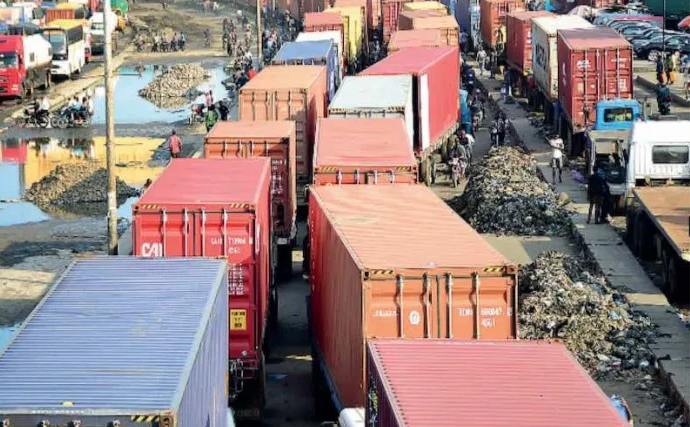NPA Ready To Deploy Electronic Call-up, To Ease Apapa Gridlock

- Moves to save Nigeria $10bn annual loss of agro products
After months of planning, the Nigerian Ports Authority (NPA) will next month deploy electronic call-up system aimed at ending the protracted Apapa gridlock.
The initiative, which will be financed by a private company, Trucks Transit Parks Limited, under a public-private partnership (PPP) arrangement with the NPA, will cost N7 billion.
Sources told Flavision that when fully operational, the electronic call-up system will save Nigeria N140 billion weekly economic loss and another $10 billion annual loss of agro products.
According to the source who did not want his name in print,
The company presented a business case for regulated truck traffic regime, which shows that the system will save the country N140 billion weekly economic loss, 40 per cent of businesses that have left Apapa, will return, there will be an end to seven-14 days cargo reception delay; consequent damage to perishable export products and reverse the $10 billion annual loss of agro products.
That is not all, this effort will also save our bridges around Lagos mainland, which are old and fragile and can no longer support abuse by trucks. This will also put an end to unavailability of public funding for shared common infrastructure.
The Managing Director of Trucks Transit Parks Limited, Mr. Jama Onwubuariri, who confirmed the development, told Flavision that the effort will transform Apapa and make the port city thriving again.
He said:
Our company, Trucks Transit Parks Limited (TTP), has partnered with NPA to provide solutions to the truck traffic challenges in Nigeria. TTP aims to decongest Apapa, improve traffic flow and ultimately facilitate the efficiency and productivity of the ports. TTP will do this through the use of technology.
Our operation is based on an electronic call-up system called Ètò, through which trucks’ movements will be scheduled from the originating points of the trucks to a park, then to a holding bay/pre-gate and then programmed in batches (on a first-come-first-served basis) to access the ports. Thus, all trucks are expected to remain within approved parks until they are scheduled to access the ports or are moving from one park to another. The idea is to prohibit illegal or indiscriminate parking of trucks along the roads.
Therefore, law enforcement agents have been set up to enforce compliance and tow or fine offending trucks/truckers. Hence, an electronic call-up system that will drive the check-in and check-out of trucks from each location has been put in place to achieve this. In addition to batching and scheduling of trucks movement, TTP would also offer add-on or ancillary services such as truck wash, tyre change, truck service, accommodation etc at designated parks.
He added that the main objectives of the company’s operations were to improve efficiency at the port, decongest gridlock, improving traffic flow within Apapa logistics ring, improve accountability and eliminate extortion and improve ease of doing business.
On how it intends to achieve it, he said:
We will deploy electronic truck scheduling, park, truck and traffic management platform called Ètò, provide modern truck parks and holding bay facilities with hub amenities, use of ICT hardware such as access control, law enforcement/traffic agents to enforce compliance and registration of all ports bound trucks and drivers on Ètò.
The affected stakeholders, he added, are truck drivers, truck owners, truck drivers unions, truck owners unions, truck park operators, terminal operators, shipping companies, clearing agents.
Others, according to him are Apapa residents, workers and companies, government agencies – police, Customs, LASTMA, Road Safety, Nigerian Shippers Council, Lagos State Government (Ministry of Transport and Ministry of Environment) and Apapa Local Government.
NPA’s General Manager, Corporate and Strategic Communication, Mr. Adams Jatto, had recently confirmed the plan when he told journalists in Lagos that the system would help to address the traffic gridlock in Apapa.
We have concluded the procurement process to be able to engage our investors to manage the truck park. So with this, I believe we should be able to have something on the ground for people to be proud of. Call-up system is not just the areas we are looking at for us to ease the congestion along ports access roads.
It is a kind of temporary measure for us to ensure that we have a free flow on the axis that leads to the ports. The call-up system is for us to be able to have truck parks along ports area and some of the truck owners have assured us that they have truck parks, where they can park their trucks.
A call-up system is to ensure that in each of the areas where there are truck parks, the trucks are there and when it is time for them to come to the ports, we have to adopt the call-up system to call them. On the basis of this, we will be able to streamline the trucks coming into the ports, to ease congestion,
he had said.
Jatto had explained that the management of NPA was desirous of addressing issues of the port access roads in Apapa, through sustainable road construction.

Justin Nwosu is the founder and publisher of Flavision. His core interest is in writing unbiased news about Nigeria in particular and Africa in general. He’s a strong adherent of investigative journalism, with a bent on exposing corruption, abuse of power and societal ills.













